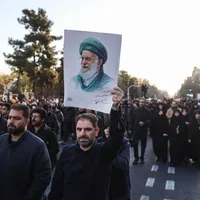The championship match of the Club World Cup in which Chelsea defeated Paris Saint-Germain 3–0 was held on Saturday evening in the United States.
Faghani, one of the most prominent referees in the world, officiated the match and participated in the tournament representing Australia after migrating there in 2019 due to disagreements with Iran's Football Federation.
The Revolutionary Guards-affiliated Fars News Agency ripped the appearance on its Telegram channel on Saturday.
“Just days after the Israeli and American attack on Iranian soil and the martyrdom of over a thousand Iranians, Alireza Faghani warmly greeted Trump after receiving his award and mimicked his pose in the commemorative photo.”
Faghani later posted a series of photos on Instagram showing his work at the tournament and his pose alongside Trump, writing: "Grateful for the opportunity to once again be part of football history."
Pro-government social media users criticized the appearance as a national betrayal.
“Alireza Faghani completed all his academic degrees (bachelor’s, master’s, and PhD) in Iran," a user celled Third Generation Khomeini Revolution wrote on X.
"But in the end, he took a commemorative photo with the invader of his homeland and the killer of Iranian women and children.”
Alireza Dabir, president of the Iranian Wrestling Federation, said Faghani should have killed Trump. "If there were any honor, he would have torn out the killer’s throat instead of shaking his hand."
Ali Akbar Raefipour, an Islamic Republic propagandist, shared an AI-generated image of hoped-for physical altercation and said Faghani should have emulated an Iraqi journalist who launched his shoes at US President Bush in 2008.
Popular among religious youth, Raefipour is a hardline Iranian speaker and founder of the Revolutionary Guards-linked Masaf Institute which promotes anti-Western narratives and conspiracy theories.
Make Iran Great Again (MIGA)
In contrast, many Iranians opposed to Tehran defended Faghani, calling his presence at such a major event a source of pride for Iran.
A hashtag for a phrase promoted by Trump during the conflict, #MIGA — Make Iran Great Again — spread among the Islamic Republic's detractors.
Prominent Iranian activist Masih Alinejad praised Faghani, saying: “You don’t have to like it. But you can’t ignore it. This isn’t about loving war. It’s about recognizing who the real warmonger is: the Islamic Republic.”
A user named Sina criticized those threatening Faghani, saying: “They’re threatening Alireza Faghani for shaking hands with Trump at a football match — a completely non-political event. Well then, what should be done with those who beg to negotiate with him?”
State-run Iranian TV did not air the Club World Cup award ceremony — a decision that also drew widespread reaction from users on social media.
Canadian-Iranian politician Golsa Ghamari reacted to the post, saying: “Iranians and Americans were once great allies, and will once again be great allies when the terrorist Islamic Republic is overthrown.”
Another user praised Faghani, saying: “He received his medal from none other than Donald Trump — the man who turned Qassem Soleimani into 'kotlet.'”
“Kotlet,” an Iranian meat patty, became a meme symbolizing the assassination of senior Iranian general Qassem Soleimani in 2020 during the first Trump administration.
Another user named Shayan Amiri shared the handshake moment between Faghani and Trump, tagging Iranian foreign minister Abbas Araghchi on X and writing: “Perhaps it’s time to take a lesson in diplomacy and class — from Alireza Faghani.”






